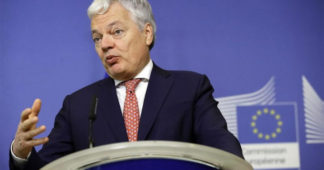Charles Cohen and Nicoletta Ionta, Euractiv
Jun 19, 2025
Using an emergency clause to bypass MEPs was to address an “existential challenge,” the Commission president wrote to Roberta Metsola in a letter seen by Euractiv.
Ursula von der Leyen has defended bypassing MEPs over her €150 billion defence loan scheme, telling European Parliament President Roberta Metsola the move is “fully justified” in response to Europe’s “existential” geopolitical challenges.
In a letter last month, Metsola threatened legal action against the European Commission over their planned use of an emergency clause in the EU treaty, effectively shutting Parliament out of approving a €150 billion loan scheme to boost joint procurement of weapons by EU countries, known as SAFE.
European affairs ministers approved the proposal later that month – with only EU governments able to scrutinise the proposal.
Now, the Commission president has defended her move, arguing the Union is facing an “exceptional emergency situation”, according to a letter dated 12 June and seen by Euractiv.
In her reply to Metsola, von der Leyen attributes use of the emergency clause to a “stark deterioration in the security context that demands a massive increase in defence industrial spending.”
Using the emergency clause is “fully justified” as SAFE is “an exceptional and temporary response to an urgent and existential challenge,” she wrote.
Von der Leyen added that the Parliament has scrutinised many other defence proposals under the usual procedure, which “shows that it has never been the intention of the Commission to circumvent the powers of the European Parliament, even in a context where the circumstances justified that measures are adopted swiftly.”
The Parliament’s legal affairs committee will vote next Tuesday on whether to proceed with legal action against EU governments at the EU’s top court.
In an email seen by Euractiv, German socialist lawmaker René Repasi, who leads the Parliament’s work on its legal disputes, recommended the committee advise President Metsola to launch an annulment action before the CJEU to strike down the SAFE proposal, citing the use of an incorrect legal basis.
The committee is likely to support Repasi’s recommendation, having unanimously backed a legal opinion in April rejecting the Commission’s move.
We remind our readers that publication of articles on our site does not mean that we agree with what is written. Our policy is to publish anything which we consider of interest, so as to assist our readers in forming their opinions. Sometimes we even publish articles with which we totally disagree, since we believe it is important for our readers to be informed on as wide a spectrum of views as possible.











